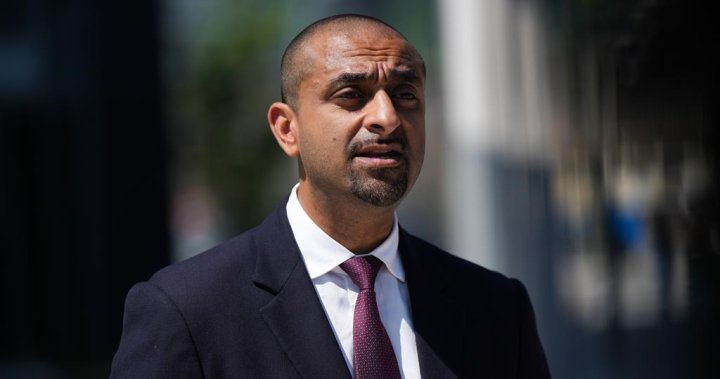When Bill Rodger and his family moved to Bridgewater, N.S., prior to his daughter’s first birthday, everything seemed in line for her to receive her first routine vaccines, including her mumps and measles shots.
But when the third wave of COVID-19 struck, the shots were put on hold.
“What they told me at that point was that they were pausing vaccines for children that were not assigned to doctors,” he told The Current. “A lot of nurses that I spoke to were very, extremely helpful people, but had their hands tied with COVID.”
“They kind of prioritized [the] COVID response.”
In the end, Rodger managed to get his daughter inoculated in the right time frame, but not every parent has been as lucky.
According to a 2021 report by the World Health Organization and the U.S. Centers for Disease Control and Prevention, more than 22 million infants worldwide missed their first dose of the measles vaccine in 2020. It’s an increase of three million from 2019 — the largest increase in two decades.

Things aren’t much better in Canada, where one in four children have missed their scheduled shots during the pandemic, according to 19 to Zero, a group that promotes safe vaccination behaviour.
“With the drops that we’re talking about … these kids [are] at risk of all sorts of illnesses that we don’t see a lot of anymore, and we haven’t seen a lot of during the pandemic because we’ve sort of been on these lockdown situations,” said 19 to Zero CEO and public health physician Dr. Jia Hu in Calgary.
By the time we get back to normal, I think it’s very easy to see a resurgence of whooping cough, or measles, or one of the things that’s sort of gone the wayside.-Dr. Jia Hu
And it’s not just Canadian kids who are missing their routine inoculations. According to a report card released by CanAge, a national seniors advocacy organization, Canada received a D minus for how well it’s protecting older Canadians against the flu, pneumonia and shingles.
“We know about one in seven older people — and that number really needs an asterisk next to it because it’s probably much more than that — have missed some form of routine vaccination because of COVID-19,” said CanAge founder and CEO Laura Tamblyn Watts.
These numbers have some doctors worried about a potential resurgence of various diseases post-pandemic.
“By the time we get back to normal, I think it’s very easy to see a resurgence of whooping cough or measles or one of the things that’s sort of gone [by] the wayside,” Hu said.
A pre-pandemic problem
Alhough the numbers are concerning, Tamblyn Watts said these problems, particularly around senior vaccinations, existed prior to the pandemic.
“We’re actually extremely bad at vaccinating older people with routine vaccinations to begin with.”

Part of it has to do with the cost of some vaccines — such as shingles, which if not covered, Tamblyn Watts said could cost around $300 per dose.
“It’s over the course of two shots, so for a family living on a fixed income, $600 is just a barrier that most people can’t afford.”
But a bigger reason why some senior Canadians miss their routine vaccinations could be a lack of information.
“On the whole, older people, if they know about adult vaccines, typically want to get them,” Tamblyn Watts said. “But it is hard to get them; either the right ones aren’t covered or they don’t know where to get them.
“What we see overwhelmingly is that people don’t know what vaccines they’re supposed to have.”
This is a similar case for parents of infants and children who should be taking routine vaccinations.
“I don’t think this is really anybody’s fault per se. But in places where family doctors provide vaccinations … you know, family doctors’ offices have often been closed,” Hu said. “So it’s hard to get your vaccine, and public health have been sort of redeployed to do other things.”
Hu said this is the main driving factor behind the decrease in child routine inoculations in the pandemic — but he doesn’t blame parents of medical staff for it.
“It’s quite a complex schedule … and if you’re seeing your pediatrician or family doctor probably every two months to kind of remind you … it’s easy to kind of forget.”
Routine vaccine awareness
If there is good news to come out of the pandemic, experts say it’s the greater population’s heightened awareness of the importance of vaccines.
“I think we faced some challenges, namely that the health system and public health … was very, very burnt out,” Hu said. “But the good news is we’ve mobilized much of society who now cares and is aware of the importance of these things.”
Hu said by optimizing vaccine access through pharmacies and community-based clinics, numbers like school-based vaccination rates have been pushed to higher than 70 per cent.
“So we really want to restore access to at least what it was before the pandemic — and through the pandemic, we’ve learnt a lot about how better to provide vaccinations and deploy those tactics to hopefully get those rates higher than they were before,” he said.
WATCH: Why more are falling for the anti-vaccination movement’s messaging:
Producers head undercover at one of the movement’s biggest rallies and exclusive VIP event in Washington D.C. to reveal the business behind the false claims. 22:30
That heightened awareness can be seen in some pockets of progress when it comes to senior vaccines, according to Tamblyn Watts.
She said some provinces and territories, such as Prince Edward Island and Yukon, have expanded their coverage and done specific outreach for vulnerable populations.
Nonetheless, there’s more work to be done — hopefully, for Tambyln Watts, on the federal end.
“It really should be the federal government that funds, like COVID-19, all of these [routine] vaccines under its public health mandate and gives it to the provinces,” she said.
“We learned that that way of doing vaccine purchasing and distribution works, and we should do it because right now, we have serious vaccine inequity.”
Hu suggested vaccine outreach groups that targeted demographics that were disproportionately impacted by COVID-19 should continue to operate post-pandemic.
“I think that a lot of these groups now know a lot about vaccines and have the trust of the populations they serve, and I think engaging them to help address the issues around routine vaccination is also critical,” he said.
It’s part of educating the greater population about routine vaccinations, which Hu believes is key coming out of the pandemic.
“Get educated, talk to your family doctor, talk to your pharmacist, give public health the call and find out what you need, and go get it.”
Written by Mouhamad Rachini. Produced by Alison Masemann and Joana Draghici.








More Stories
B.C. to ban drug use in all public places in major overhaul of decriminalization | Globalnews.ca
Reduce salmonella in certain frozen chicken products: USDA to producers | CBC News
More than 115 cases of eye damage reported in Ontario after solar eclipse